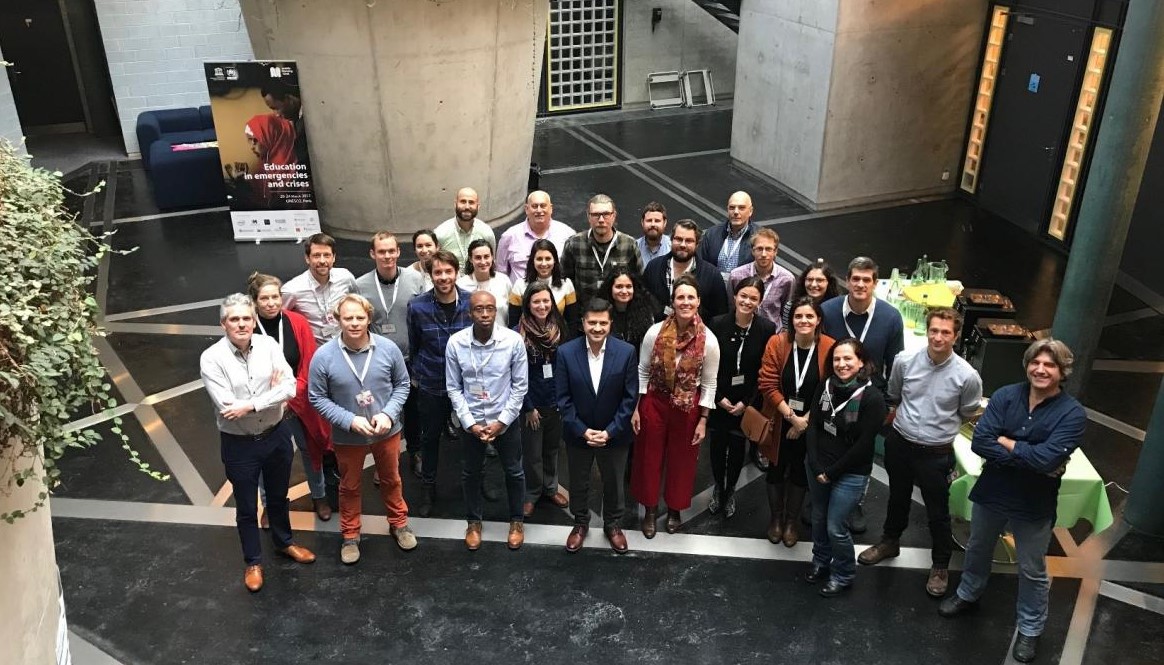This is the first of a series of blog posts on building resilient WASH systems in fragile contexts.
Published on: 11/02/2020
Every human being has the right to safe drinking water and sanitation. However, this is not a given worldwide as fragility and armed conflict have increased over the last decade. This fragility stems from a range of causes including (armed) conflict, political crises, climate change, weakening governance, and overall poverty. And it poses a major global threat; droughts, floods, famines and violent conflicts are things that more and more people face than any time in the past 30 years. Without action, more than 80% of the world's poorest will be living in fragile contexts by 2030, and with an annual financing gap of US$ 60 billion fragile states represent half of the world's financing gap to meet Sustainable Development Goal (SDG) 6 (total: US$ 114 billion).
In deteriorating contexts, like the Sahel, immediate humanitarian needs are on the rise as WASH services become compromised. Current systems that were meant to provide services fail to meet daily needs. Where usually the development sector would leave, and direct and in-parallel humanitarian support would come in – the Water Under Fire report of UNICEF underlines that we can no longer respond to crises with humanitarian assistance alone – we must work towards building sustainable and resilient services. For that reason, in December 2019, a learning event was organised on Building Resilient WASH systems in fragile contexts by the global WASH cluster, UNICEF, ICRC/IFCRC and the German WASH network in Geneva.

Participants at the Geneva event on Building Resilient WASH Systems in Fragile Contexts, 12-13 December 2019
Here actors from both the humanitarian and development sector came together to find synergies and a common language, and to design a humanitarian approach that would include the sustainability principles of the development sector. This topic is not new. The nexus between life-saving humanitarian responses to the development of sustainable water and sanitation systems for all, while taking opportunities to build peace (Humanitarian Development Peace Nexus), is well anchored in the Agenda for Humanity. In practice, the nexus is often not adhered to due to its complexity and differences within and between humanitarian and development organisations.
IRC as a development NGO, works mostly in stable contexts with local governments with 'good enough governance' to build and strengthen WASH systems that are sustainable and resilient. However, IRC's systems strengthening work is also being affected by the scourge of violence. Currently, we are expanding to Mali and Niger as new focus countries. And for one of our current Country Programmes - the one in Burkina Faso – a country in the wake of extreme violence and regional instability, it is becoming vital to find synergies with other organisations with experience in working in fragile contexts, such as Water for Good, International Committee of the Red Cross and others.
We are used to supporting governments in our focus countries with amongst others planning, monitoring, life-cycle financing, and policies and legislation that provide WASH services that last. These concrete steppingstones are what we call the building blocks of the WASH system. Or, also defined as all of the behaviours, policies, processes, resources, interactions and institutions necessary to deliver inclusive, lasting, universal access to WASH. It involves actors (people and institutions) and factors (infrastructure, finances, policies and environmental conditions) that affect and drive the system. Here you can read more about IRC's WASH systems approach and its building blocks.

IRC's WASH systems framework
In Geneva, complex questions around WASH systems thinking were asked and discussed to get both sectors on the same page. Is systems strengthening (through service authorities) still possible at all in contexts where the government is not adhering to humanitarian principles?, in what ways do fragility and humanitarian contexts present an opportunity for systems strengthening?, and how can we adapt our programming in fragile and humanitarian contexts to strengthen systems?
In other words, how can we as IRC also adapt our way of working to the deteriorating political and economic environment in Burkina Faso, Mali or Niger?
In a fragile context, developing countries are often characterised by weak state capacity or weak state legitimacy. Therefore, the delivery of public services is problematic in fragile states and working through government becomes a burden. The delivery of such services would require a state with some capacity and legitimacy. It is therefore not surprising that the 20 most fragile states (Fund for Peace Index, 2019) are among the countries with the lowest levels of access to water and sanitation services. In order to support those left behind, the humanitarian sector comes in (in parallel) to provide immediate aid.
In Burkina Faso – a country where we have been working for a number of decades, we need to make sure that we find synergies and partnerships with the humanitarian actors that come in to provide basic needs and aid, and that they make use of the systems that are in place. Only then, can we make sure that a) our development efforts and expenditures are not in vain, b) WASH systems remain resilient and sustainable, and c) humanitarian interventions are truly sustainable/ systemic and supporting beneficiaries in the long run. As concluded in Geneva, we need to realise sustainable management and use of climate-resilient water and sanitation services and ensure that human rights to water and sanitation are always respected, including during and after natural and human-made disasters.
At IRC we have strong opinions and we value honest and frank discussion, so you won't be surprised to hear that not all the opinions on this site represent our official policy.